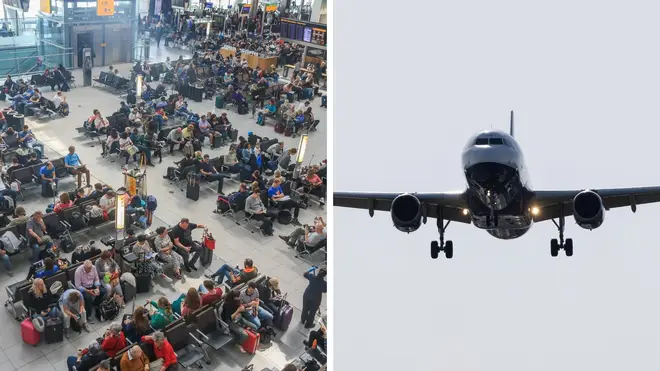
Nick Abbot 10pm - 1am
25 April 2022, 11:25 | Updated: 25 April 2022, 11:28

British tourists deserve automatic refunds for cancelled flights, MPs have said.
The UK Civil Aviation Authority (CAA) should be given "more teeth" to crack down on airlines that do not completely refund customers when required to do so by law, the Transport Committee said.
In a report published on Monday, it said the regulator should be allowed to slap fines on airlines.
It added that airline passengers should be granted automatic compensation, removing the need to apply for a refund.
During the Covid pandemic, thousands of passengers had flights cancelled and were unable to travel due to constantly changing government restrictions.
Several Brits reported long delays in getting their money back, which the committee claimed could be avoided in the future if the aviation watchdog is given stronger powers to protect passengers.
Read more: Portugal becomes first EU country to defy Brexit border rules as Brits fast-tracked
Read more: Holidaymakers face travel 'nightmare' as millions return from Easter getaways
Our report #ReformForTakeOff was published earlier today. Read our key recommendations for recovery in the UK aviation sector
— Transport Committee (@CommonsTrans) April 25, 2022
Huw Merriman, the Tory chairman of the Transport Committee, said he recognised "the difficult position faced by Government" but the industry and passengers had been left "confused and unable to plan ahead".
"This resulted in a severe economic deficit for the aviation sector. Thousands of people lost their jobs. Many more could not visit their loved ones," he said.
"Now that Government has removed all coronavirus-related restrictions on international travel, ministers must get on with protecting the sector against future economic shocks and reassuring passengers that future restrictions will only be implemented in extreme circumstances.
"Legislation is urgently needed to give the industry more flexibility to recruit new staff for the summer, to give the regulator more teeth to intervene on behalf of consumers and to provide protection from airline insolvencies."

Daniel Barnett on rights of those affected by BA flight cancellations
Responding to the MPs' report, Paul Smith, consumer director at the CAA, said: "We have regularly asked for stronger consumer enforcement powers, including the ability to impose fines on airlines.
"This would allow us to take faster action when appropriate and bring our powers in line with other sectoral regulators.
"Proposals outlined in the government's recent consultation on enforcement powers, which are supported by the Committee, will - if implemented - improve passenger rights and equip the Civil Aviation Authority with better tools to act swiftly and effectively for the benefit of consumers."
The document also called for ministers to publish an aviation recovery plan by June "as a priority" and for an airline insolvency bill to be introduced to better protect consumers, employees and taxpayers.
Plans to ensure swift Covid testing can be put in place for passengers to travel if required by other countries should also be established, the MPs said.
The recommendations come after the National Audit Office said in a report last week that there had been no system to measure the success of measures such as the traffic light system, self-isolation, testing, quarantine hotels and passenger locator forms.
A Department for Transport spokesman said: "Our priority was protecting public health and these measures bought vital time for the rollout of our successful booster programme as we responded to new and concerning variants.
"We also ensured they were in place for no longer than absolutely necessary and the UK was the first country in the G7 to remove all travel restrictions.
"In future, the Government's default approach will be to use the least stringent measures, to minimise the impact on travel as far as possible and these will only be implemented in extreme circumstances."